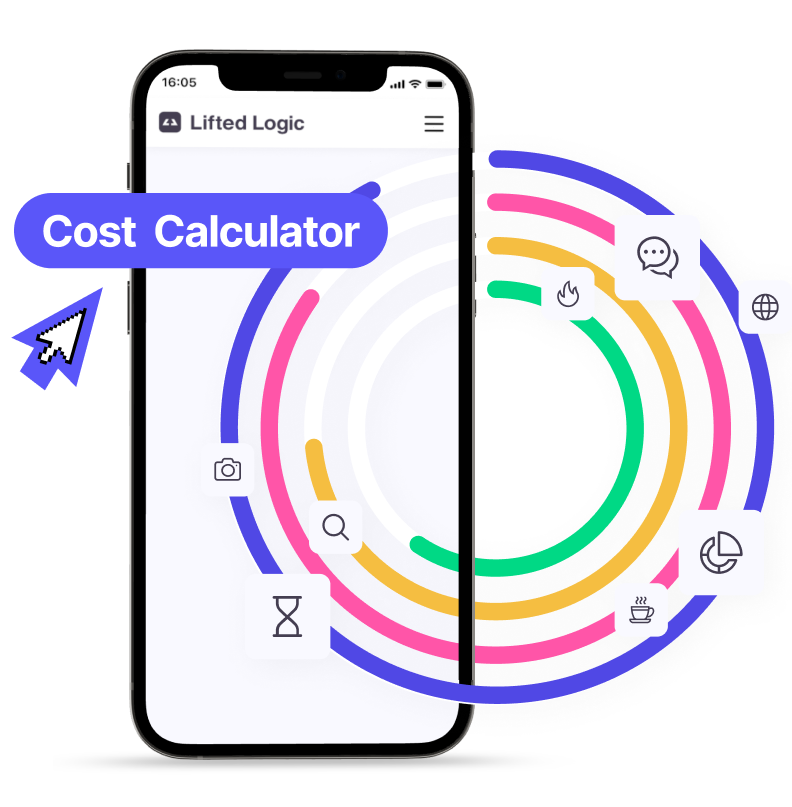Unedited, AI-generated content is digestible but hardly a meal to write home about.
Here Comes the Future… Yay?
New advancements in AI technology are announced almost every day. Trying to keep up with it all can make you dizzy, and what’s just around the corner is anyone’s guess. The headlines are full of mostly exciting possibilities for the coming years.
The good news: artificial intelligence will be the silver-bullet solution to problems X, Y, and Z.
The bad news: you’ll be chained up in your basement at the mercy of your robot butler. Or something like that.
AI is certainly reshaping the way we operate in the world. That much is clear. At a glance, it may even seem like AI is spelling out the end of human-written content as we know it. But can AI replace flesh-and-blood writers?
The Value of AI
There are now more AI writing tools available than you have time to read about. The keyword here is tool. To be clear, I’m not trying to persuade you that AI = bad . There is definitely a time and a place. AI writing tools can be useful for:
- Brainstorming ideas
- Proofreading your work
- Generating halfway-decent to decent copy
A quick browse-around will show you the web is stuffed with halfway-decent writing. There was already a surplus of bland, unexceptional content before the AI boom. Now, it’s growing exponentially. It’s becoming much harder to stand out with mediocre content, no matter how polished and error free.
Acceptable was never sexy, but now it’s a recipe for irrelevance
AI-generated content has a tendency to sound robotic, repetitive, and unoriginal. Given how accessible, affordable, and fast AI tools are, it’s hardly surprising that some people are having AI write almost everything for them.
But replacing human wordsmithing with AI-written content comes at a cost.
Uncanny Valley
What generative AI does best is regurgitate generic content based on the data it was trained on. If you’ve played around with language models like ChatGPT, you may have discovered that something feels a bit off about the writing.

It can be difficult to pinpoint why, but it turns out that people often experience a negative reaction to things that seem nearly (but not quite) human. We’ve got a special kind of bullsh*t detector that goes off when we see, hear, or read an imperfect imitation of human intelligence.
The Limitations of AI-Generated Content
AI language tools imitate human intelligence and verbal expression, but they have a hard time imitating two essential ingredients of great writing: creativity and emotional intelligence.
If you’re going for bare minimum and will settle for legible writing, this blog might not be for you. It sounds like you’re all set with the free stuff.
If, on the other hand, you’re looking for creative, emotionally engaging content that converts and persuades, then human expertise is a must. There’s a wide gap between imitation and innovation—especially in the marketing world.
The Human Touch
So, why should you hire writers of the organic variety when there’s an all you can eat buffet of (FREE) AI content at your fingertips? Humans know humans like only humans can.

I’ll let you in on a secret: expert human writers don’t have to feel sincere when writing emotionally engaging content. They can do what they do because they know what it’s like to be sincere. AI, as we know it, will never have that.
Human + AI
As a human copywriter myself, I suppose I might sound a bit biased when I compare the unedited AI-generated content to the kind of fluff meant for stuffing into empty teddy bear skins in a mall near you. Fair enough. Still, I have to admit that AI writing tools can be game changing when used to assist humans well versed in the ways of words.
Doctoring up AI-generated content is time consuming but can be done well by a skilled writer. This lucky writer playing the role of AI-babysitter has to craft and recraft the perfect prompt until it spits out workable content that still requires extensive edits and rewrites.
In my experience, AI is best used to enhance human writing. Not the other way around.
Why Hire (Expert) Human Writers?
We Are:
Out of the box and a little unruly
Creativity is something that AI can, at best, approximate. What gives living, breathing writers the edge here is our individual experiences and perspectives. It helps that we’re not always the most predictable.
To be clear, I’m not trying to say your business needs to be a one-of-a-kind original to be noticed. Artistic achievement is, after all, not exactly synonymous with profitability. By creativity, I mean combining strategy and imagination to achieve goals in new ways.
Emotional (I mean… emotionally intelligent)
For the most part, people aren’t motivated to take action based on logic or analytics. Emotion is the propulsion that has us flying around by the seat of our pants.
We writers understand emotion, and like your customers, we’ve got a nose for sniffing out a fake. Connecting with readers on an emotional level is pretty much how we stay employed.
We don’t have to crawl the web to understand customer pain points or know what it feels like to be a human in an increasingly automated world.
At some point, we’ve all been stonewalled and gaslighted by a virtual customer service agent. We’ve been on that phone call where the automated voice asks you one one too many times if you need to hear the options repeated in Spanish. The tears, the rage, the unrepeatable obscenities – that’s all part of the quintessential human experience.
A Chatty Bunch of Collaborators
With human writers, you get the benefit of genuine back and forth. Instead of a tool, you get a creative partner. Yes, some writers may be tools (insert eyeroll here), but we’re not talking about them. You can go ahead and replace them with AI.
If you’ve tried your hand at ChatGPT, you might know how hard it is to communicate vision in a prompt. You don’t always need to communicate your goals succinctly when you’re talking to a professional writer. It’s our job to polish things up and make it punchy.

We might not be able to write a 2,000 word blog in a matter of minutes, but we can have a genuine conversation.
Masters of voice & context
Businesses are built on interaction and relationships. And the way you communicate with your clients and customers defines those relationships; it’s at the heart of who you are to them.
Whether or not you realize it, your voice becomes a sort of contract between your brand and your intended audience. You need that to be consistent across channels.
A good writer has to be a master of impressions and ventriloquism. Well, not literally. Most of us aren’t that creepy. What I’m talking about is the ability to write in other people’s and brands’ voices and project those voices into the context of their brand story.
AI language tools often struggle with the subtleties of voice, but they also struggle with context. It’s just data. Without context, communication lacks direction and impact.
The great thing about professional writers is our ability to use an intuitive understanding of context to make data both useful and meaningful.
SEO Writing—It Had to Come Up at Some Point
Writing for the web requires an additional skill beyond engaging with human readers—a skill that may, at a glance, seem to be more about writing for the algorithm overlords than anything else.
When ranking on the first page of search results is the goal, you have to understand the system and play the game by its rules. But we mustn’t forget who it’s for.
SEO writing done well—using the system for its intended purpose—has to be laser-focused on the end user. There’s a human out there with a short attention span and questions that need answers. Optimizing your content for search engines can help you capture that person’s attention, but your content, your product, and your solution have to keep it.

At the end of the day, it doesn’t matter if the robots like your sh*t. They are not your audience. They just help your audience find your sh*t. As with AI, using SEO responsibly is about facilitating human connection and interaction—not replacing it.
Using a highly searched keyphrase x number of times isn’t going to cut it. The right keyphrases are the ones that match your content to the intent of the user—it’s knowing who they are, what they’re searching for, why they’re searching for it, and why now.
Users aren’t just demographic data points with varying levels of spending power. They’re every bit as emotional, irrational, imaginative, and complex as you or me. You have to get into their heads and try on their shoes. AI tools can help with SEO writing, but the best insights on humans will always come from insightful humans.
So… Should you hire a copywriter?
Would you trust a self-service kiosk to be the face of your business (assuming you don’t sell self-service kiosks)? Is a non-human interface good enough for building a long-term relationship with your customers?
If your answer is yes, then you might be okay without a human writer. That being said, you still wouldn’t have someone in your corner with the know-how to set you apart from an army of identical competitors.
What matters most is knowing exactly who your audience is, tailoring your content to them, and using every interaction with them (be it an ad, email, web copy, phone call, or a smile when they step through your door) to build a relationship.
For the foreseeable future, I’ll be thinking of relationships as something of a human specialty.
“AI can change how we work, but people will always have a place 🙂 It’s the same thing we say about SEO. We’re not writing for robots, we’re writing for humans.”
— Becca Stebbin, Content Director at Lifted Logic
Lifted Logic isn’t the same as it was 10 years, 10 months, or even 10 days ago. Every day is a step forward. We’re always improving and adapting to the world in real-time.
Our relationship with AI is sure to evolve, but our commitment to writing kickass custom content isn’t going anywhere. While we may use AI tools to help us brainstorm or proofread, we do not and will not use AI-written content.
We’re data-driven content experts with a pulse, here to get to know you and your target audience as humans. But we’re also caffeine-powered denizens of the web. Geared up with the latest tools, we might seem like cyborgs. But we’ll always be people writing for people.
*Adam Fichman was unavailable for comment, but his robot butler left a message:
“Greetings! This is Adam Fichman, CEO of Lifted Logic. I could not be more excited for an exciting future of human-AI collaboration. There is absolutely no reason for humans to be concerned about an inevitable AI takeover.”





